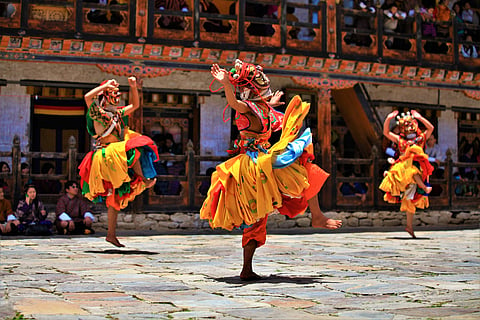
- Destinations
- Experiences
- Stay
- What's new
- Celebrating People
- Responsible Tourism
- CampaignsCampaigns
- SubscribeSubscribe
- Buy NowBuy Now

Bhutan in the Eastern Himalayas has a reputation for its friendly people, rich cultural heritage, peace-loving society, stunning natural beauty, and commitment to responsible tourism, as evidenced by the fact that is the world's first carbon-negative country. The country has so fiercely guarded its unique Buddhist culture that it did not admit tourists until the 1970s. Fast forward a few decades and in 2023, the country welcomed approximately 1,03,000 visitors, about two-thirds below its pre-pandemic record of 3,15,000 tourists in 2019.
As questions around travelling amid climate breakdown and the rise of over-tourism continue to gain steam, Bhutan is leading the charge in developing and executing a sustainable and responsible tourism policy that not only fills its coffers but most importantly, keeps its natural and cultural heritage intact. Here are five tourism lessons that other countries can learn from Bhutan.
Since 2008, Bhutan has been practising a “high value, low impact” tourism policy, which limits the number of tourists that enter the country. This approach aims to preserve Bhutan’s unique cultural heritage and pristine natural landscapes while generating revenue for conservation efforts. Its most talked-about measure is the Sustainable Development Fee (SDF), a daily levy paid by visitors to support the country’s development.
The SDF is collected by the national exchequer and funds are allocated to various projects that create long-term, sustainable opportunities for the Bhutanese people. This includes free healthcare, education and training, upskilling the tourism and hospitality industry, improved infrastructure, environmental preservation and conservation, cultural preservation programmes, and initiatives that support local businesses and economies. Currently, the SDF is USD 100 (approximately INR 8,690) per night for adults from all countries except for India. The SDF for Indian nationals is INR 1,200 per person, per night.
Community-based tourism is a cornerstone of sustainable travel in Bhutan. This approach ensures that local communities actively participate in and benefit from the tourism industry, creating a symbiotic relationship between visitors and hosts. For instance, guests visiting Bhutan are encouraged to witness traditional ceremonies, live with residents in their homes or guest houses, purchase handmade crafts, participate in guided tours led by community members, and be a part of the everyday life of Bhutanese people. Furthermore, community-based tourism serves as a platform for educating travellers about responsible tourism practices. Visitors learn about the importance of cultural sensitivity and environmental conservation, and how their choices can positively impact the communities they visit.
Bhutan’s use of the GNH index over Gross Domestic Product (GDP) has been lauded worldwide. Conceptualised by the fourth King of Bhutan, Jigme Singye Wangchuck, the index attempts to be a more direct measure of collective happiness by emphasising harmony with nature and select cultural values, as expressed in the four pillars and nine domains of GNH. The four pillars include sustainable and equitable socio-economic development, environmental conservation, preservation and promotion of culture, and good governance. The nine domains refer to living standards, education, psychological wellbeing, health, time use, cultural diversity and resilience, good governance, community vitality, ecological diversity, and resilience.
GNH is calculated using surveys of 148 questions, and is conducted in person every few years. The most recent survey from 2022 sampled 1.4 per cent of the population and gave the country an average happiness score of 0.781 out of one, a score that defines the Bhutanese as precisely 3.3 per cent happier than they were in 2015.
While the GNH has been criticised as a propaganda tool by the Bhutanese government to distract from human rights abuses and increasing levels of poverty, its emphasis a holistic approach towards notions of progress and giving equal importance to non-economic aspects of wellbeing has paved the way for other countries to reconsider their economic indicators.
As part of Bhutan's commitment to sustainable travel, the country prioritises building of eco-friendly lodgings that blend comfort with environmental consciousness. The accommodations—many of which adhere to internationally-recognised certification standards—are strategically nestled amidst the country's stunning landscapes and offer tranquil retreats that have minimal impact. They often employ energy-efficient practices by utilising renewable energy sources such as solar power and hydropower to minimise their carbon footprint. Furthermore, waste reduction and recycling programs are taken seriously in Bhutan, whether it’s composting organic waste or doing away with single-use plastics. This extends to water conservation measures too, where guests are encouraged to participate in responsible water usage. Innovative technologies, such as pressurised piped irrigation systems, are often employed to reduce water consumption.
In parallel to its renewable energy efforts, Bhutan has also prioritised organic farming (the National Organic Programme under the Ministry of Agriculture and Forests has developed and promoted organic farming to produce safe and healthy food for local consumers and other markets). The use of chemical fertilisers and pesticides is strictly regulated, ensuring that agricultural practices are environmentally sustainable. Finally, many lodgings showcase traditional Bhutanese architecture, incorporating local materials and design elements.
As mandated by its constitution, 60 per cent of Bhutan’s land is under forest cover. Native wildlife—including endangered Bengal tigers, snow leopards, black cranes and elephants—all roam free in the country’s five-million-acre network of protected areas. This benefits the world, too, as the forests in this country act as a carbon sink and draw out greenhouse gases from the atmosphere.
Bhutan has also implemented robust anti-poaching measures to combat illegal wildlife trade. The Royal Bhutan Police and local communities collaborate to patrol and protect wildlife habitats, ensuring the safety of endangered species and contributing to the global fight against wildlife trafficking. The country addresses the challenges of human-wildlife conflict through educational programs, technological solutions and community involvement. Ongoing research and monitoring programs also play a crucial role in Bhutan's wildlife conservation efforts, which extend to endangered species such as the snow leopard and the red panda.
